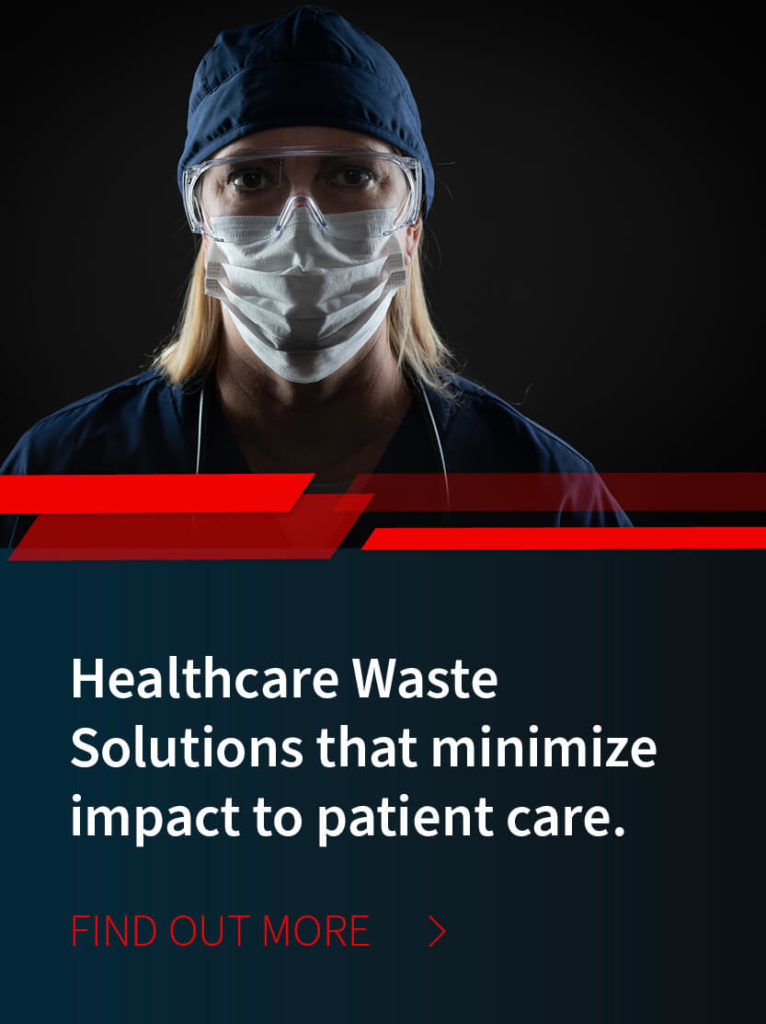
/ IN THIS BLOG
Whether you run a small rural clinic or a 500-bed hospital in Georgia, you need to abide by a number of overarching medical waste regulations. Outside state-specific regulations are those of the federal government. Your doctor’s office or hospital must follow the rules of both to maintain compliance. While requirements for medical waste management in a small doctor’s office are not the same as the scope as that of a large hospital, you should be aware of (and working with people who are aware of) potential similarities and differences.
01 / Definitions are Important
Turn to Georgia’s state administrative codes and the Georgia Department of Natural Resources as well as the Georgia Environmental Protection Division for definitions or types of medical waste, as the waste stream determines how medical waste is collected, stored, transported and disposed of.
For example, Georgia’s solid waste management definitions state that biomedical waste is “any solid waste which contains pathological waste, biological wastes, cultures, and stocks of infectious agents… chemotherapy waste, discarded medical equipment and parts…” (Rule 391-3-4-.01).
Hazardous waste implies “any solid waste which has been defined as hazardous waste in regulations promulgated by the Board of Natural Resources, Chapter 391-3-11.” As you can see, you may need to review a number of agency regulations to obtain a thorough grasp of definitions that may be applicable to your facility. The federal Environmental Protection Agency (EPA) provides information on how to identify listed and characteristic wastes here.
Know the difference between regulated and non-regulated medical waste in Georgia. In this state, regulated medical waste is often referred to as biomedical waste. While these two terms refer to the same kind of waste and need to be treated in the same manner, terminology may differ between facilities.
Every state throughout the country may deal with and handle their medical waste in slightly different ways, including descriptions and terminology, but they all must abide by the rules of the EPA and the Resource Conservation and Recovery Act (RCRA). The RCRA establishes the foundation for management of hazardous and non-hazardous solid wastes.
It can get confusing, which is why it is important to turn to experts when determining identification of the types of waste generated at your physician’s office or hospital. For example, a waste can be non-hazardous but still regulated, such as medical waste that is not surgical or radioactive in nature.
Knowing what you’re dealing with in regard to medical waste is your first order of business in determining practices and protocols that will ensure you are in compliance to avoid fines. For additional details, turn to Georgia’s Environmental Protection Division for in-depth rules, laws, and enforcement, forms, and permits.
02 / Doesn’t every State Have the Same Medical Waste Laws?
While every state in the country must abide by federal healthcare waste management and disposal regulations, be aware that not all states have the same laws regarding how they handle medical waste. State-by state regulations do vary. South Carolina, for example, is very strict about what's included in a manifest (for transportation of hazardous medical waste). They even require the weight of what's being put on that manifest and sometimes the specific name of the person processing the waste.
Georgia, on the other hand, is more lenient about such details. Georgia’s environmental rules for solid waste management can be found in the Official Code of Georgia (OCGA) under 391-3-4, while rules for hazardous waste management are found under 391-3-11.
Guidelines for medical waste generators in regard to requirements may also differ slightly between states, as do permits. In Georgia, generating more than 2,200 pounds of hazardous waste in a single month defines you as a large waste generator, which stipulates more forms and paperwork than that of a small quantity waste generator. The volume of waste generated by any medical provider will also determine how long that waste can be stored before it is transported off-site for disposal.
Don’t forget about the Occupational Safety and Health Administration (OSHA) when it comes to handling medical waste. Because OSHA is a federal body, all OSHA laws take precedence over state regulations. However, a particular state can choose to impose laws that are stricter than OSHA's requirements but are not allowed to be less strict.
03 / About Storing Medical Waste in Georgia
The type of waste your medical facility generates will determine how long you can store that waste prior to pick-up and disposal. For example, turn to Rule 391-3-4-.15 for specifics on generation and/or storage of biomedical waste in this state.
Georgia's laws don't require the biohazards waste to be locked up. However, it must be:
Where patients or the general public can't access it
Properly labeled to ensure that cleaning crews don't accidentally throw it away
Stored in a cool, dry place and protected from weather events, animal foraging, and prevents breeding ground for rodents and insects
Be aware that in Georgia, as in other states, sharps must be disposed of and stored prior to disposal in compliant sharps containers that prevent leakage, tearing, spillage, or crushing.
04 / General Medical Waste Disposal Regulations
General rules for proper and safe medical waste management apply in every state. That means, whether you run a clinic in Georgia or a hospital in California, you have to adhere to these rules for full legal compliance. Specific rules apply for medical waste transporters and waste disposal management companies.
Permits - Every state requires all medical waste management companies that pick up medical waste from your doctor’s office or hospital have proper permits to do so. Remember, more than one permit may be required depending types of waste, such as red bag waste and other types of regulated and/or hazardous wastes.
Insurance - A waste management company must also have adequate and approved insurance to cover any potential incident involving the waste. As the generator of that medical waste, you – the medical waste generator - assume cradle to grave liability. That is, until that waste is properly treated and disposed of, you're still liable for what happens to it even after it leaves your facility. Protect yourself by working with a company that is adequately insured.
Medical Waste Transport - Regardless of state, you need to use proper and compliant packaging regulations prior to shipping your generated medical waste off-site. Such containers are most commonly cardboard boxes or plastic tubs. Whatever is used must be leak-proof, rigid, and properly and carefully prepared. That means:
Everything must labeled correctly. (This includes items such as the incineration label for trace chemotherapy and pathological waste as well as the general biohazard symbol for any biological wastes)
All bags securely tied (even if they are inside a box or bin)
All scalpels, knives, and syringes placed in sharps bins in order to comply with proper sharps disposal. Don't forget each bin must also be a puncture-resistant sharps container. This ensures the safety of everyone who handles these boxes at any point in the transport process
Lids are taped shut prior to shipment
Depending on the type of waste, transportation requirements may require a bill of lading (for non-hazardous waste) or a hazardous waste manifest.
Because federal and state laws must be followed, it’s a good idea to work with a reputable full-service medical waste management company that has the experience and knowledge of federal and Georgia state regulations to ensure compliance when it comes to your medical waste management and disposal processes.
For more information about Georgia waste management, contact a representative of MCF Environmental Services.
Robert Losurdo
President, COO








